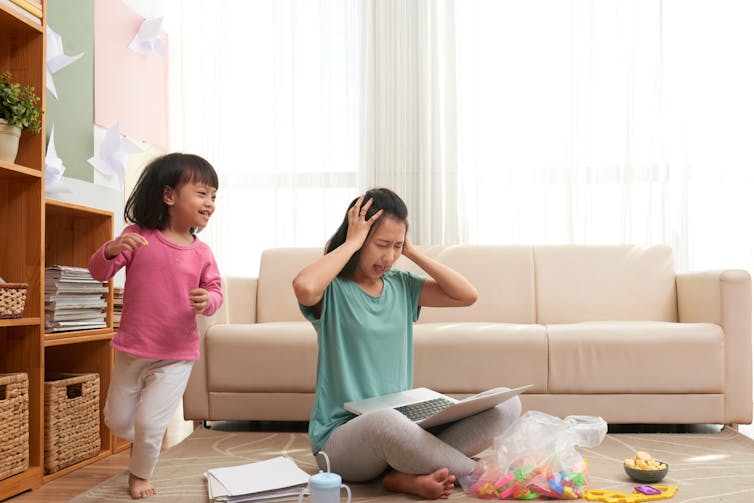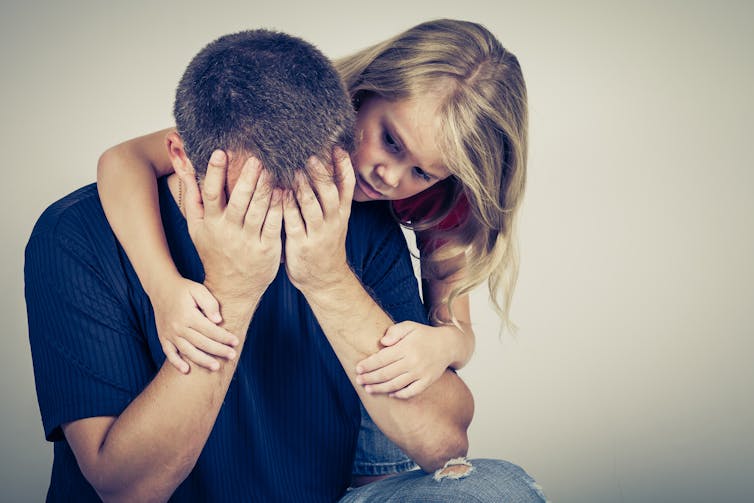From crying in the toilet to leaving the house in a rage, many parents and carers don’t want their children to see them getting emotional. But should you be hiding emotions, or should you come clean about your fear of spiders or how angry you are with your boss?
While the topic is complex, some clear answers are beginning to emerge from the research.
Many parents worry that showing negative emotions in front of their children will cause them to suffer. For instance, children may end up thinking it’s their fault or simply “catch” the emotion.
Indeed, this latter worry has a sound basis – the phenomenon of “emotional contagion” is real, and one recent study found that parents can transfer their fear of going to the dentist, for example, to their children.
On the other hand, there is the intuitive idea that we should “be real” with our children, and that they will benefit from watching a parent who struggles and eventually copes with their negative emotions like any other human being.
If your child sees you doing that, then shouldn’t this help them to learn to cope with their own emotions?
The Danger of Suppression Or Hiding Emotions

‘Tell me what’s going on…’ Dragon Images/shutterstock | Image courtesy: The Conversation
There are three concepts to consider when it comes to emotional display in front of children: suppression, “uncontained” expression, and talking about emotions.
Suppression of emotion is when you hide the outward signs of an emotion. Unfortunately, hiding emotions doesn’t work very well – the act of suppressing your emotion actually increases your blood pressure and physiological arousal. Observers can pick up on your distress despite your efforts to hide it, making them feel stressed, too.
Recent research has also found that when parents feel negative emotions (like anger or resentment) and withhold them from their children, they experience lower relationship quality and diminished responsiveness to their child’s needs.
In fact, even babies are very tuned in to the dynamics of their parent’s interaction with them. If you dampen down these natural dynamics, babies can find it upsetting.
This is dramatically illustrated in the famous “still face” experiments, in which the parent holds a flat, unresponsive expression for a brief period of time. This is a reliable stress inducer, even for very young infants – they are clearly uncomfortable with an unexpressive parent and usually make attempts to get the parent to interact with them.
On the other hand, “uncontained” expression of anger and sadness by the parent is also not helpful for the child. Uncontained means high intensity emotion, with no attempts to regulate or take ownership of it.
Shouting, smashing things and blaming someone else “for making you angry” are all examples of this.
In the case of a fear of the dentist, uncontained emotion would mean acting as though dental practices really are dangerous places, rather than saying “I know I have a fear and I am trying to cope with it”.
Hiding Emotions From Kids? This is The Middle Ground
So, if at one extreme suppression is bad, and at the other uncontained expression is also bad, what is the middle ground?
That would be talking about emotions, taking ownership of them and showing your child that you are trying to cope with them.
Classic research found that six-year-olds had better emotional understanding and perspective taking skills if their mothers had talked to them about their emotions at the age of three. In fact, the more the mothers had talked, the better the outcome.
How Transparency With Kids Affects Their Reaction

Sharing is good. altanaka/Shuttestock | Image courtesy: The Conversation
In another study, mothers kept a diary of the emotional expressions they had shown their preschoolers, including details about how they coped with and explained these.
The children of mothers who expressed more sadness and tension had higher emotional knowledge, as assessed by their teachers. And in cases where mothers explained the reasons behind their sadness to their child, the child’s prosocial behaviour was found to be higher.
This is most likely also the case for fathers, it is just that research on parenting has historically been carried out on mothers.
How To Have A Balanced Approach To Parenting

Image courtesy: Pixabay
But how can you actually achieve a balanced approach at home? Consider the following three options.
-
You are very sad and you have to leave the room to cry. Your child senses something is wrong but doesn’t know what it is.
-
You are so sad and you can’t stop crying in front of your child.
-
When you are very sad and have a little cry, and tell your child that you are very tired and have had a bad day – and that it’s got nothing to do with them. And, you explain that you are going to sit down and relax and talk to your friend on the phone, and soon you will feel better.
Only the third scenario affords an opportunity for the child to learn about emotions and how to cope with them. Researchers refer to this as the parent acting as an “emotional coach”. In this style of parenting, negative emotions are viewed as an opportunity for children to learn how to solve problems.
Clearly, parents shouldn’t hide emotions or completely unleash them without limits. Instead, they should openly talk about their emotions to their child, especially about the causes of their emotions and how they are trying to deal with them.
So the next time you feel sad, angry or frustrated and your child is watching you expressing emotion, do explain what’s going on in terms they can understand. You could be doing them a favour. It could also be good for you – children are wonderfully compassionate and will often offer some advice that will most likely put a smile on your face.
Written by John Lambie, Reader in Psychology, Anglia Ruskin University
This article is republished from The Conversation under a Creative Commons license. Read the original article.
ALSO READ:
Study Shows Parents May End Up More Stressed When Their Kids Watch A Lot of TV
To Parents of Boys: Here’s Why Emotional Support Is So Important

 Together Against RSV
Together Against RSV SG60
SG60 Pregnancy
Pregnancy Parenting
Parenting Child
Child Feeding & Nutrition
Feeding & Nutrition Education
Education Lifestyle
Lifestyle Events
Events Holiday Hub
Holiday Hub Aptamil
Aptamil TAP Recommends
TAP Recommends Shopping
Shopping Press Releases
Press Releases Project Sidekicks
Project Sidekicks Community
Community Advertise With Us
Advertise With Us Contact Us
Contact Us VIP
VIP Rewards
Rewards VIP Parents
VIP Parents
